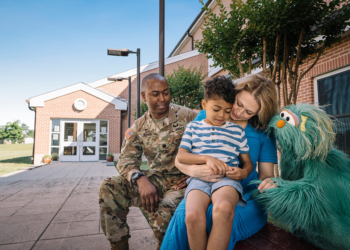There is a mantra for passengers on airplanes — in case of an emergency, put the oxygen mask on yourself first so that you are capable of helping others. The same principle can be applied to a healthy life.
Military life can feel overwhelming, leaving little time for spouses to make themselves – and their health, a priority. Taking care of a family — sometimes solo, working, going to school, setting up and dismantling a home every few years, and the wait and worry of separations. These are just some of the common threads that bind military households. At the foundation of those households is the constant — the military spouse, and while treading to stay above water it can be challenging to maintain self-care. An obstacle, experts say, must be overcome.
Discover what works for you

Christina Landry, founder of DumBell Fitness, wasn’t always into exercise. The Navy wife of 16 years joined the military right after high school and struggled with her weight. Then, she had two daughters 16 months apart and gained 60 pounds. While her husband deployed, she found that the only time she got to herself was working out at a local gym. It became a valued part of her day that she looked forward to.
While stationed in Hawaii, Landry decided to start her own fitness program when she saw spouses struggling to find available on-base childcare.
“When we were first stationed at Pearl Harbor, I dropped my two girls off at school and went straight to the base gym to workout. While walking in, I noticed one of the moms dropping her kids off at the gym daycare being turned away because the room was too full. I thought ‘If someone would have turned me away at that critical time (she had a baby and a young toddler), I never would have tried again,’” she said. “I thought, ‘I can provide an awesome workout group in the neighborhood with guaranteed babysitting for all those participating.’”
Landry is an advocate for the benefits of group exercise, specifically because it gives spouses an accountability partner (or several).
“It’s easier to keep yourself accountable when you know your friends are expecting you. It’s also cheaper than a personal trainer. Group instructors usually love what they do and they want to help you achieve your best. Lean on that instructor and your friends for success,” Landry said.
Even though she promotes group fitness, she encourages military spouses to be open-minded to various types of programs until they discover the one that feels less like punishment and more like fun.

“My advice, don’t get stuck thinking there’s only one-way into fitness. There are so many options. If one doesn’t fit your lifestyle, or doesn’t seem fun enough, try something different,” she said. “You will make time for the things that you like. Just because a program worked for your friends, doesn’t mean it will work for you.”
Be realistic in goal-setting
Personal trainer Cindy Neldner says she hears spouses express common challenges in trying to maintain a healthy lifestyle.
“I hear the main excuses of time, lack of motivation, lack of support, not seeing results quick enough and other similar excuses,” Neldner, a military wife of 18 years, said. “I find that spouses get discouraged, especially if they are looking to the scale as validation for their work. In many cases, changes are happening as they lose fat and gain muscle. The scale is usually the last measurement to reflect those changes.”
She added that many resources exist to help spouses get started and stick with it. Installations offer free facilities, group exercise classes, and nutritional counseling. Off-base groups have been formed by spouses and veterans offering physical and social activities, such as Stroller Warriors and Team Red White & Blue.
Another typical issue spouses encounter is being new, and unfamiliar, with a duty station. Neldner, who has been stationed overseas for five years, suggests jumping in head first by using the networking options common to military communities to find like-minded workout friends.
“Dive into a new base and try out classes at your new station. Talk to the instructors to get a feel for the workout and make new friends. Walk around and join any social gatherings that you can find,” she said. “Making friends is important, especially at overseas locations when away from family and friends. Talk to your Key Spouse about programs and services.”
Get started
Seasons of life change. Maybe there was a chapter of life where eating healthy and working out came easily. It can be hard to know how to get started. It can be even harder to make it stick. Here are ways to take the first steps, using one day (and hour) at a time:
TIME
Mentally make yourself a priority. Schedule a date with yourself and don’t cancel. Make it a healthy date. Doesn’t have to be just working out. Maybe you use one hour to grocery shop for only healthy meals, or maybe you meal plan for an hour. Just start to get comfortable with the idea that your health is worth the time and that you need that one-hour to better yourself. Don’t use that hour for anything other than making yourself better.
ACCOUNTABLITY
Schedule one-hour dates with others — that way you feel less inclined to cancel. Tell a friend to meet you at the park for a walk or jog. Try a new class with a friend, or make a new friend at a new class. It will take time for your body to get used to the idea of exercise and results won’t happen immediately, but keep going. Don’t think of exercise as just a goal that you need to obtain. Think of it as a lifestyle, or a journey.
Gone are the days of thinking that fitness is only used to make us look “skinny.” We now know that fitness is much more about mental and physical health. Recognize the changes in your well-being, not just your pant size, Christina Landry adds.
COMMIT TO SOMETHING
Find a race, event or something to train for. This could be a 5K, 10K, an obstacle course event (ex. Spartan or Tough Mudder) or something else. This will ensure that you follow a training program and stay consistent. Grab a friend or someone with similar goals to train with and keep you accountable.
THINK OUTSIDE THE BOX
Exercise is essentially just moving to create a cardio response. Coaching your kid’s soccer team could be fun. Do the drills with them. Installations also offer alternative activities if traditional workouts don’t interest you — paddle boarding, hiking and kayaking are just some options.
START SMALL
Start walking and invest in a pedometer (ex. Fitbit or Garmin). Any activity is good activity. Move more and get outside. Military OneSource offers Health and Wellness Coaching free for service members and dependents. Learn more about how counselors can help you online.
Read comments








































